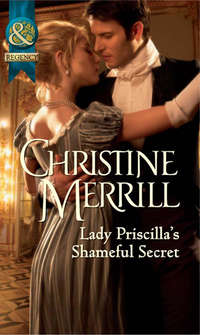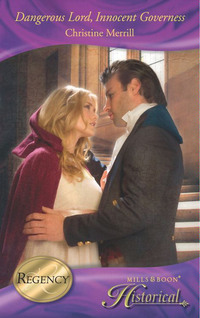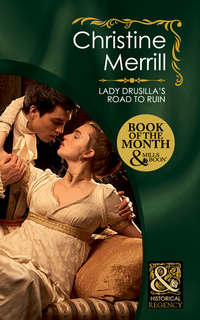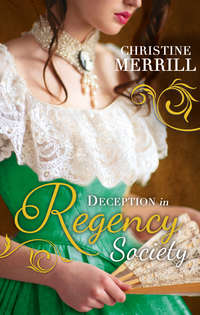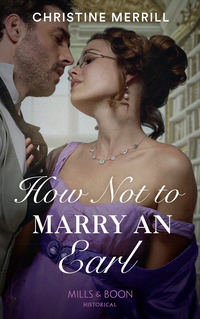
Полная версия
Dangerous Lord, Innocent Governess
Daphne took a deep breath and scooped up the paper from the floor, straightening out the wrinkles and laying it back on the table. ‘Since I did not assign her a subject, I have little right to complain about the finished work.’ She tried to ignore the subject matter and focus on the execution. Then she looked down at Sophie. ‘I would not normally give lessons so advanced to one as small as you. But it is clear from looking at it that you have more than normal abilities for a child of your age.’ She crouched down beside the girl and urged her back into her seat.
Sophie looked at her in confusion, tears in her eyes, still half-expecting punishment.
‘It is all right,’ Daphne said. ‘You needn’t worry. I love to draw as well. And I know how comforting it can be to sit with pen and paper, especially when one has something on one’s mind. Unless I tell you otherwise, you may draw whatever you wish. Is that all right?’
The girl gave a hesitant nod.
Daphne steeled herself to look again at the wrinkled sketch. ‘You have a good eye for detail and your proportions are fair. But no one has taught you about light and how to draw it.’
The girl gave her a puzzled look.
She smiled back encouragingly. ‘You might think that there is nothing to see in empty air. But it is possible for the artist to show the light, by showing the shadows. Let us put figure drawing aside for now, and start with something simple, like an apple.’
She took a blank sheet of paper, and drew a rough fruit, then showed Sophie how to choose a direction for the sun, and put in shading and highlights with a bit of chalk. Then she offered the paper back to the girl. ‘Now you try. Begin with round things, like apples. And then try something with angles, like the bookcase or the window frame.’
Sophie looked at her with growing amazement, as though these were the first words she had understood in hours. And then she smiled and took the pencil back in her hand, placed a fresh sheet of paper on the table and bit her lip in determination, bending eagerly over her work.
Daphne watched the older children, who were exchanging looks of surprise and confusion, as though she had interrupted the perfectly intelligible Greek with a language they could not understand. She turned to them, hands on her hips. ‘I suppose this is as good a time as any to see how you children draw. Lily, show me your watercolour book.’
‘I do not have one.’ The girl was almost stammering in embarrassment.
Daphne fought down the feeling of triumph. ‘You do not draw?’
‘It is hardly necessary, for if one knows maths and languages…’ Edmund said in a starchy tone.
‘Your father knows those things, I am sure. And how to draw, as well. He enjoys gardening, does he not?’
‘He is a botanist,’ said Lily, as though deeply offended by the slight.
Daphne waved it aside, not much caring about the difference. ‘Then he must know enough drawing to render the plants he works on.’
The older children’s eyes grew round, as though they had never considered the fact.
‘And I doubt he would like to hear that you are dismissing any element of your education as frivolous. We must work to correct our ignorance, rather than making excuses for it.’ And now it was her turn to be surprised. That last had sounded rather like something her school mistresses had said to her. Perhaps all that was necessary to turn oneself into an educator was to starch one’s bodice and put on a stern expression.
She smiled at the children so as not to appear too forbidding, remembering the minimal effect such lectures had had on her. ‘For now, you may continue with the lessons you have. But in future, we shall see that you gain some talent for art.’ She smiled at Sophie, who was dutifully drawing an apple from memory. ‘After I have got the more advanced student properly settled.’
The little girl turned to her with such a look of surprise on her face that it almost made her forget her role and laugh. But then Sophie smiled, as though the words were better than rubies to her. With such talented siblings, she had never been the star pupil.
And if what the older children had said was true, she had endured far worse since Clare had died. So it helped her to draw horrible pictures to help recover from her mother’s death. Was there really any harm in it? Daphne picked up the sheet of paper, considered throwing it on the fire, and then smoothed it and set it aside. If it was destroyed, the poor girl would only draw it again.
She stared down at the image of her cousin, crumpled in death. The girl had drawn it from memory, just as she had the apple. Had no one the sense to keep her away, so that she did not have to see such a horrible sight? But the picture was very informative, for it showed just what she had expected: Clare lying on her back as though she had toppled backwards, and not fallen face first as one likely would if the death were accidental.
Without realising it, Sophie might help to prove her mother’s murder.
Chapter Four

Daphne took the picture and placed it between the pages of her own sketchbook. It was too disturbing to hang on the schoolroom wall, but the information in it was too important to discard. She would conceal it for now, then take it to her room where she might examine it in detail. She encouraged the children to work on what they wished, and gave only the barest supervision, assuming that they would come to little harm reading from their texts.
At lunch time, Cook delivered trays of food to the nursery dining room, and they paused in their lessons to eat. The same seemed to hold for tea, and would happen at supper just as Mrs Sims described. The household had given the children no reason to come below stairs at all, if they did not wish to. She wondered if the intent was to keep them away from their father. For if it was, it told the real truth about the loyalty of the servants to their master. They would support him, of course. They took his side in what had happened to his wife, and frowned on gossip about it.
But they feared him, feared for the children and kept them far out of his path.
When a maid had come to clear away the tea things, and they were almost ready to return to the classroom, she noticed a shadow from the doorway that fell across the room.
Lord Colton was there, observing them. She had not heard him approach, and could not shake the feeling that he had been standing there for quite some time, unnoticed. It put her on her guard. Though she doubted he had seen or heard anything of interest, it was disquieting to think him so adept at spying.
‘Miss Collins.’ He gave the same curt bow he had given her on the previous day, and she feared he was ready for another disquieting battle of wills.
Before he could catch it, she broke her gaze, and gave another curtsy, eyes downcast to hide her discomfort. ‘Lord Colton.’
‘How are the children today?’
‘Very well, my lord.’ She hoped that she was not expected to go into detail on their progress, for she had nothing to add.
‘We shall see about that. For if I find otherwise, I will turn you out, no matter what the Duchess might say.’
She flinched at the suddenness of the threat. And when he saw her reaction, and that she was showing none of the bravado of yesterday, he gave a faint laugh and went to greet his children.
She felt her muscles tense in instinctive defence of them. They were stubborn little beasts, to be sure. But what could one expect, when they had a monster for a father? What poison had he poured in their ears about their mother? And what abuses had they undergone to leave them so suspiciously quiet?
Colton’s smile changed as he approached the children. As he looked at them, the lines seemed to smooth from his forehead, and his lips were turned upwards not in a cynical parody of mirth or seduction, but with joyful anticipation. The tension in his body disappeared, making his movements easy. He seemed to become younger with each step, almost as if he were a denizen of the nursery wing and not the master of the whole house.
He came to the boy first, bending down, smiling and offering his hand, which his son took and gave a pale imitation of a manly clasp. The father asked how the studies were progressing, and the boy answered that they were satisfactory. And then Colton said something in what sounded like Latin, and the boy answered quickly and easily, as though in his native tongue.
They conversed thus, for a few minutes, and the child cast a sidelong look in her direction. They were talking about the new governess again, were they? If she lasted long enough to make a difference here, she would take an opportunity to teach the children some manners. It was quite rude to switch languages, and take advantage of the ignorance of others. Even more so when the other was your teacher and had so much ignorance to abuse.
The boy said something adamant, his jaw set in a stubborn parody of his father’s.
The older man shrugged. With a half-smile, he glanced in Daphne’s direction and shook his head. Then he turned to the older girl and dropped to one knee so that he could greet her face to face.
‘Bonjour, Papa.’ She gave him a shy kiss upon the cheek, but her smile had a wicked glint to it. She continued in French, as though she wished to prove that she could best her brother in something.
Her father answered her in the same language, and they proceeded to discuss the day. Daphne had less trouble with this, for she knew more than a little French, although the girl did speak quickly for one so young. Apparently, the day was bon, as was the new teacher. Although the girl was equally adamant that such guidance was not necessary, and that they would show him how well they could manage, if left to their own devices.
Her father answered with a c’est la vie. If Tante Penny wished it, then what were they to do? The children must prove that they could take care of themselves by giving no more trouble to the new teacher, for he knew what mischief they were capable of. While he did not wish her here, neither did he wish to see Miss Collins running to his study in fits, or, worse yet, to the neighbours, because his children were being naughty. But if the governess were to try any of the evil tricks that the last one had, they were to send word. He would come and deal with her, and there would be no more trouble. He looked up at Daphne, to make sure that she had understood the warning.
She looked back at him, and raised her chin a fraction of an inch to show that she did not fear him. She had to admit, if the last woman had been as bad as the servants said, the family had a reason to be less than trusting of her.
But while Lord Colton obviously disliked her, his conversation was surprisingly innocent, and he was even tempered with both children. It came as rather a surprise, for she had expected some sign of the problems there. Perhaps the children did not understand what had happened to their mother, or their father’s part in it. He must be a master actor, to be so calm and pleasant with them that they felt nothing of what he had done.
And then he turned again, dropped to both knees and held his arms wide. ‘And where is my little Sophie? Come here, darling, and give your papa a hug.’
She turned and looked, expecting to find the strange, haunted child warming to the sight of her father, as the other two had done. But instead, she heard a quick scurrying behind her, and felt the tug upon her skirts. When she looked down, she saw Sophie’s little face turned up to hers, the tear-stained cheeks pressed tight to the fabric of her dress, fingers white and claw-like, twisted into the cloth so tightly that Daphne was afraid that there would be holes worn in it, when she managed to get the girl to release her.
And the little eyes were shut tight, screwed closed, as the mouth murmured something silently, over and over again, like a prayer.
‘Sophie, sweetheart, come here and tell me about your day.’ She would have expected the tone to be more demanding, in response to such obvious disobedience. But instead it was even softer, and more gentle then it had been the first time. ‘Did you draw a picture? You love to draw.’ There was a wistfulness to the tone, and Lord Colton cleared his throat, and addressed Daphne directly, as though she might not have heard. ‘She very much loves to draw, and is surprisingly proficient, for a girl of such small years.’
The little girl burrowed further into her skirts, clinging even tighter, as though each word from her father’s mouth was a blow upon her back.
Daphne looked helplessly at the master of the house, afraid that he would demand that she pry the poor creature loose, and turn her over to him. Then she put her hand upon the head of the child in a gentle caress, and felt the girl snuggle against it, eager for protection.
Still on his knees, her employer dropped his hands to his sides in a gesture of defeat. ‘No hug today then, little Sophie? Tomorrow, perhaps. I will wait.’ If she wished to see the man punished for his deeds, perhaps it had already happened. He was brought to his knees before her, and his daughter’s rejection was sufficient to leave him broken, his shoulders slumped, his expression downcast. As he rose to his feet, he seemed a much older man than he had when entering the room.
‘It is good to see you all doing well.’ He glanced at Daphne as though she were a canker in a rose. ‘And so, I will leave you in the capable hands of Miss Collins.’ It appeared she had bested him, without even realising they were competing. Lord Colton turned to leave.
The two older children took a step forwards, as though to stop him, but then froze in their tracks, afraid to signal.
And young Sophie was the strangest of all. For though she was obviously terrified of the man when he came close to her, she watched his retreating back with a hunger greater than the others. Daphne could feel the girl tensing, ready to spring after the man in the doorway, to throw herself upon him like a little animal.
But if she wanted her father to stay, why would she not just say so? It was clear that he wanted to be with her, and the other children as well. It was only Sophie’s rejection that was keeping them away.
Daphne shook her head, confused at her response to the scene. She was not here to make it easier to reconcile father and daughter. She was here to get the horrid man away from them, so that they had a chance at a normal life.
Chapter Five

Daphne rose the next day when the sun crept over the horizon, just as she had the day before. So this was to be her routine, while in the Colton house. Rise at dawn, take all meals above stairs with the children, and have what little time to herself she could, after she had readied them for bed. They had gone to their rooms easily enough after the previous night’s meal. And she had taken time straightening the classroom and lingering in the dining room over a cup of tea.
Before going up to bed she had passed Sophie’s room, trusting that the older children would not need her help. And through the door, she had heard faint sounds of the girl whimpering in her dreams. But when Daphne had opened the door to come to her aid, she had found a candle burning on the nightstand, and Lily, sitting on the edge of the bed, her hand on the little girl’s shoulder. She’d looked up at Daphne, as though annoyed at the intrusion, and whispered, ‘She will be all right in a moment. But it is best not to wake her.’
Daphne nodded. Not her choice of action, perhaps. She would have shaken the girl awake immediately. But there was nothing about the sister’s actions that seemed rooted in malice. In fact, it appeared that Lily often took the role of comforter, and showed no desire to give it over to a stranger. Daphne had trusted her to do what was best and gone to her room.
Once there, she’d removed Sophie’s sketch from her own book and hidden it under the folded gowns in her trunk. Should someone enter the room, it would not do to let them think she was too interested in the subject. But should she need to provide proof of what she had found, it would be invaluable.
That morning, she went to breakfast with the children, and from there to the classroom. The Duchess had been right. They were quite capable of teaching themselves. In some subjects they were clever enough to teach her. She let them proceed, helping with such few questions as they had, trying to do as little damage to their educations as possible.
But if she wasn’t actually needed in the schoolroom, there was no reason she could not slip away for a short time, to begin her search of the rest of the house. She excused herself under the guise of going to the library for a book. And with one last glance at the bowed heads, she shut the schoolroom door and hurried down the hall.
She looked into the children’s rooms first. There was nothing out of the ordinary in Lily’s or Sophie’s room, other than that the connecting door appeared to stand open at all times, in testament to the sisters’ close bond. Further down the hall was Edmund’s room, orderly but boyish. And beside it the cold, dark room that would be Lily’s, still with some of her things scattered around, as if waiting for her to return.
She moved more slowly now. Somewhere down the hall was the master suite, and there was a risk of blundering into Lord Colton. Although at this hour he should be below in the conservatory, where she suspected he spent most of his days. She turned the knob on the door at the head of the stairs, and found his room, quiet and empty. It was ordered to the last degree, with no ornaments on the dressers, no item out of place in wardrobe or drawers. There was no wrinkle in the cover on the bed, no mashed pillow or lump in the mattress to hint that the owner of the bed might sleep restlessly, from guilt or any other reason.
If she had not known better, she would have suspected that the person whose room this was did not reside in the house. It was almost too neat to be inhabited. It was a blank. A cipher. And it was unlikely that he might be hiding anything in it. If he meant to write a journal of confession, there was not even a writing table on which to do it.
Perhaps Clare’s room would be different. She glanced to the wall that had the connecting door. If the servants had not already cleared the room, there might be some evidence of the state of her cousin’s mind in the days before her demise.
But when she put her hand to the knob, it did not turn. Locked. She sighed in exasperation and exited cautiously into the hall, ready to enter from there.
Also locked.
Every room on the floor was open to her, including the master’s bedroom. The only place she could not search was the room of her beloved Clare. In her mind, it became the room she most wanted to see. For there would be no reason to lock it if there was not something to hide.
She walked back down the hall to the nursery, frustrated by her defeat.
When she returned to her desk, the tea things had arrived. The children were busy, red heads bowed over the tray, pouring her a cup. They looked up as she entered with such innocent smiles that she was immediately suspicious.
So she smiled back at them, as guileless as they were, and said, ‘You are preparing my tea things. That is very kind of you.’ She took the cup they offered, watching the intent way they observed her, waiting for her to take the first drink.
She sat down on the small settee in the corner, and paused, with the cup halfway to her mouth, noting the rapt expression on the faces of the older two children.
‘But it is hardly fair that I should be able to take tea, while you have nothing.’ She set the cup down upon the tray, and, without looking at the contents, offered it to Edmund. ‘You should drink before me, for you are the heir and I am but a servant.’
The boy looked at the cup with alarm.
She smiled. ‘Here. Take it.’ She held the cup out to him again.
He picked it up, tentatively, and sipped.
She held up a hand. ‘Just swish it about your mouth for a bit.’
The boy made a terrible face, looking like he would gag rather than take another sip.
She waited for a second. ‘Now spit it back into the cup, please.’
He hurried to do as he was bade.
‘And smile.’
The boy opened his mouth to show a face full of bright purple teeth.
She smiled in satisfaction. ‘Just as I thought. You put ink into my tea, as a trick. And you never stopped to think what might be in the ink, or that it might hurt me.’
Конец ознакомительного фрагмента.
Текст предоставлен ООО «ЛитРес».
Прочитайте эту книгу целиком, купив полную легальную версию на ЛитРес.
Безопасно оплатить книгу можно банковской картой Visa, MasterCard, Maestro, со счета мобильного телефона, с платежного терминала, в салоне МТС или Связной, через PayPal, WebMoney, Яндекс.Деньги, QIWI Кошелек, бонусными картами или другим удобным Вам способом.


